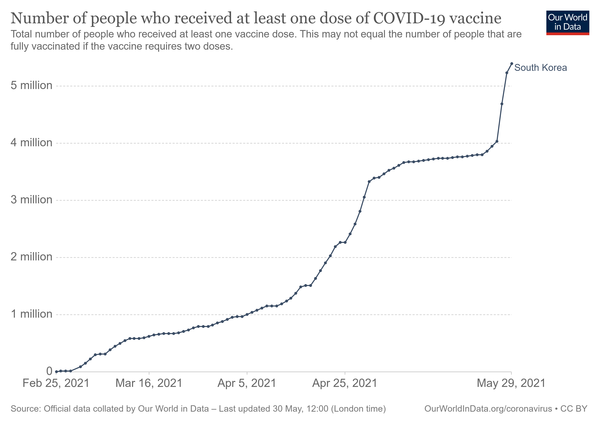Despite its excellent quarantine results against Covid-19, Korea’s overall score to deal with the pandemic has recently been lowered due to the nation’s sluggish vaccination process.
Korea is ranked third from bottom – after Japan and New Zealand – in the 37-member Organization for Economic Cooperation and Development in vaccination rate.
To raise the rate and attain herd community by November as targeted, the public health authorities are going all out to immunize the public against Covid-19, making the best use of the nation’s mobile intelligence technology (IT) services.

In part because of the relatively successful contamination of the pandemic and because of the slower-than-expected progress of homegrown vaccine development, Korea began giving Covid-19 vaccination relatively late to other developed countries on Feb. 26.
The government gave the first Covid-19 vaccine to 18,489 people on the first day. About two months later, it immunized two million people on April 22. The nation continued to accelerate vaccination pace and gave shots to another two million in a month, reaching 4.03 million on May 26 and an additional 1.4 million in the following three days.
In doing so, the government got domestic IT companies involved in the national vaccination program to increase its efficiency.
Last week, health authorities announced that application-based platforms Naver and Kakao would provide services for the low-priority group to search and to make reservations for leftover vaccines.
Under the service, users can access real-time information on how many Covid-19 vaccines are left because of no-shows by people in the high priority group, including older adults and healthcare workers, and make vaccination appointments at a nearby medical facility.
Koreans above 30 are eligible to make online reservations on the two websites or applications.
In early 2020 when Korea faced an air mask supply shortage in the initial phase of the pandemic, the government also provided the data to IT companies that made applications for searching leftover masks.
At the time, people had a hard time finding face masks, with many of them having had to turn back when the stock ran out.
"People could secure air masks thanks to the efforts of private applications and web service developers who developed and upgraded their applications since the government's public data was released," National Information Society Agency President Moon Yong-sik said. "The service was initially unstable with heavy traffic, but the company managed to improve the data entry process at the sales site, showing a fairly high accuracy of piled mask stock."
The private IT sector actively participated in the infection control policy, including introducing a banner notifying the ongoing infection status from the beginning of the early pandemic. IT companies then took part in public service and developed applications to let people know the remaining quantity of masks to minimize confusion.
In addition to the applications showing the number of air masks left nearby, the nation also began providing electronic Covid-19 vaccination certificates to prove the person has received the vaccine.
Now the came companies are applying their experiences and know-how to helping health authorities speed up the vaccination schedule.
“Aided by the unexpected arrival of 1 million more doses of the Janssen vaccine from the U.S., the nation will likely upgrade its first half-year vaccination target from 13 million to 14 million people,” said Sohn Young-rae, a key official at the government vaccination headquarters on Monday.
The government is also providing a vaccination certification application named COOV (Corona Overcome), available at Google Play Store or Apple App Store.
The move comes after some countries began giving vaccination certificates to those who received the Covid-19 jabs.
Iceland first issued a vaccination certificate to the public on Jan. 21. Singapore Airlines also started to provide a digital health verification process for the Covid-19 passports from December in the private sector.
Koreans who have received at least one Covid-19 shot and got the certification would be excluded from the less-than-five limit in the family meeting, benefit discounts when using some public facilities and cultural programs, inoculation badges, and opportunities to participate in leisure programs from June.
After July, those who took the Covid-19 vaccine could take off their air masks outdoors and would be excluded from the limited number of people for religious activities, including regular worships, masses, liturgy, and sealing ceremonies.
However, the government emphasized that wearing a mask is still essential even after taking the Covid-19 shots because it is impossible to block Covid-19 infection completely.

